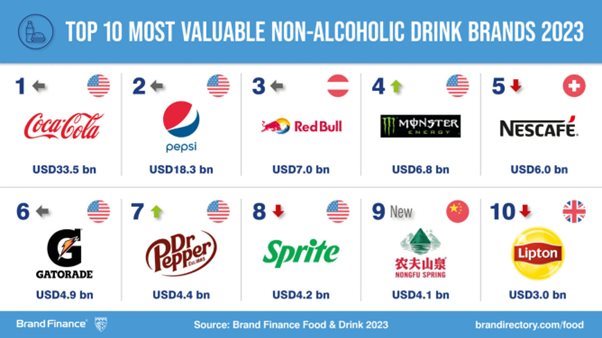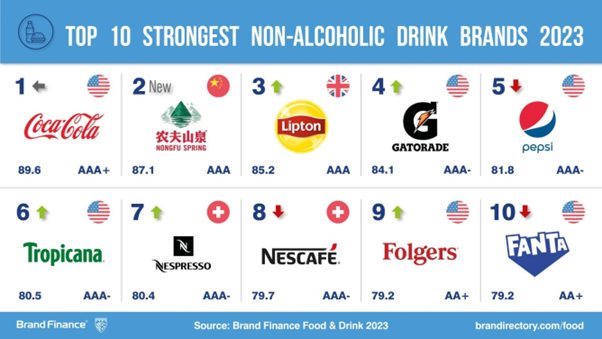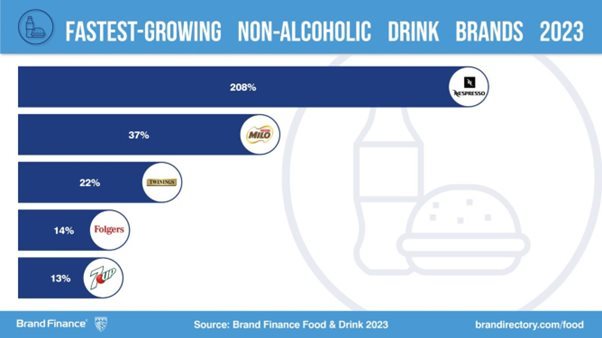
Top stories




Marketing & MediaAds are coming to AI. Does that really have to be such a bad thing?
Ilayaraja Subramanian 21 hours


More news
















Coca-Cola’s (brand value down 5% to $33.5 billion) enduring brand value can be largely attributed to its global familiarity and reputation, bolstered by innovative product developments, large-scale marketing campaigns, and digital engagement.
Ahead of the Fifa World Cup in 2022, the brand launched its‘Believing in Magic campaign, aiming to celebrate the shared passion and connection experienced by football fans and foster deeper consumer relationships.
The brand also launched its digital engagement platform, the Coca-Cola Fan Zone. Approximately five million fans connected with the hub that was activated in 41 markets, further boosting the brand’s international exposure and prestige.
“With a rich history, iconic brand story, and a steadfast dedication to customer experience and satisfaction, Coca-Cola has remained a global leader,” says Savio D'Souza, valuation director at Brand Finance.
“The brand continues to boost its international reputation and capture the loyalty of generations across the globe through ingenious and powerful marketing campaigns, product evolutions and innovative digital strategies.”
In addition to calculating brand value, Brand Finance also determines the relative strength of brands through a balanced scorecard of metrics evaluating marketing investment, stakeholder equity, and business performance.
Compliant with ISO 20671, Brand Finance’s assessment of stakeholder equity incorporates original market research data from over 100,000 respondents in 38 countries and across 31 sectors.
Coca-Cola also maintains its position as the world's strongest non-alcoholic drinks brand, with an AAA+ rating and a Brand Strength Index (BSI) score of 89.6/100.
The giant continues to enjoy immense global recognition and popularity. Its iconic brand narrative, logo, and memorable marketing campaigns, aimed at connecting with consumers on an emotional level and evoking nostalgic sentiments, have become deeply ingrained in popular culture and have fostered customer loyalty across the globe.

Red Bull (brand value up 1% to $7bn) Monster (brand value up 8% to $6.8bn) and Gatorade (brand value down 7% to $4.9bn) maintain their top 10 ranks this year, with Red Bull ranking as the third-most valuable non-alcoholic drinks brand.
Energy drink consumption has continued to rise since the pandemic, with both adults and teens seeking energy drinks as convenient options to fuel busy and active lifestyles.
Red Bull remains one of the world’s most recognisable drinks brands, with a unique brand identity, catchy slogan, and enormous global presence fuelled by its various sporting endorsements and sponsorships.
Nespresso’s (brand value up 208% to $2.9bn) brand value has increased enormously since the pandemic, when home coffee consumption surged as customers sought a premium experience at home.
With its emphasis on quality and luxury, Nespresso became a popular choice.
The brand has continued to boost its premium perceptions and global reputation with its innovative range of coffee machine and capsule offerings, as well as its sustainability initiatives, winning an award in 2022 for its innovation efforts in promoting fairtrade coffee.

As part of its analysis, Brand Finance assesses the role that specific brand attributes play in driving overall brand value.
One such attribute, growing rapidly in its significance, is sustainability. Brand Finance assesses how sustainable specific brands are perceived to be, represented by a ‘Sustainability Perceptions Score’.
The value that is linked to sustainability perceptions, the ‘Sustainability Perceptions Value’, is then calculated for each brand.
Coca-Cola has the highest Sustainability Perceptions Value (SPV) at $4.6bn. It should be noted that the brand’s position at the top of the SPV table is not an assessment of its overall sustainability performance, but rather indicates how much brand value it has tied up in sustainability perceptions.
That said, Coca-Cola promotes an ambitious sustainability agenda, aiming to make 100% of its packaging recyclable globally by 2025 and use at least 50% recycled material by 2030.
The company also aims to implement sustainable solutions throughout its value chain, aiming to reduce greenhouse gas emissions by 25% by 2030 and achieve net-zero carbon emissions by 2050.

Every year, leading brand valuation consultancy Brand Finance puts 5,000 of the biggest brands to the test, and publishes over 100 reports, ranking brands across all sectors and countries.
View the full Brand Finance report.